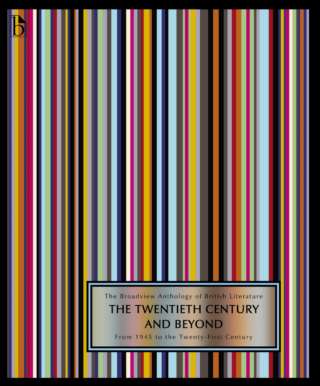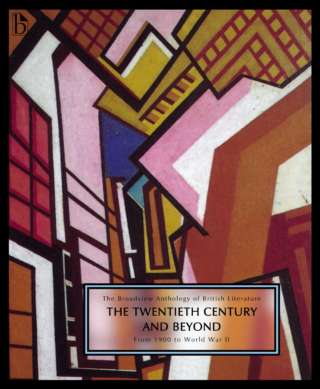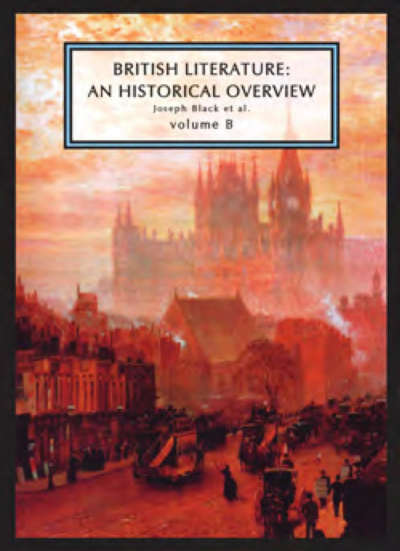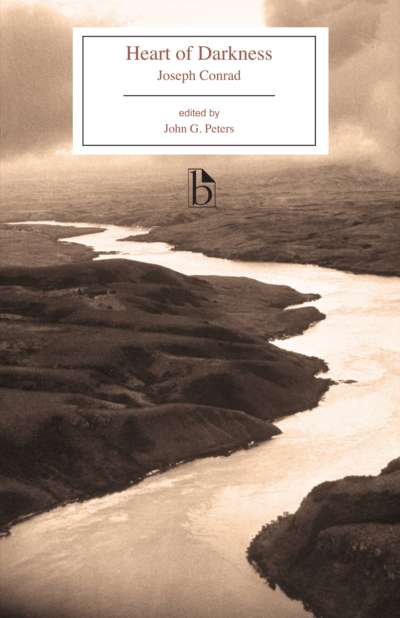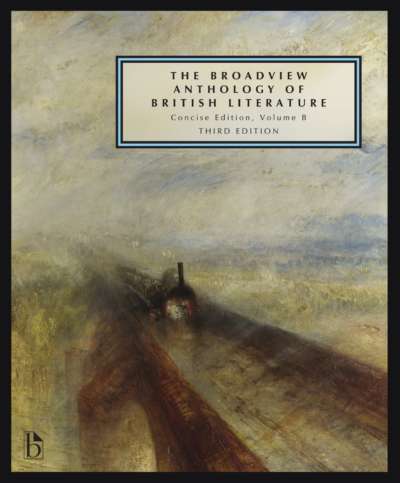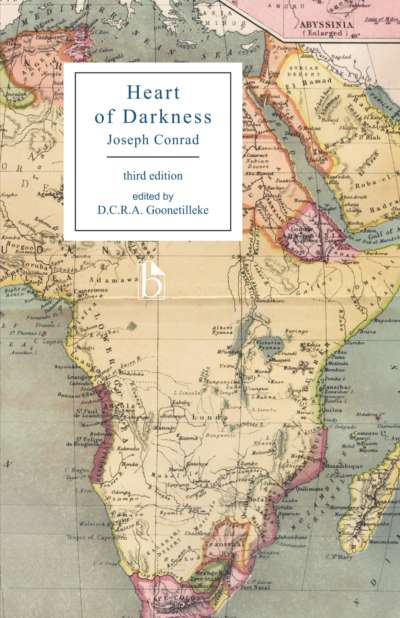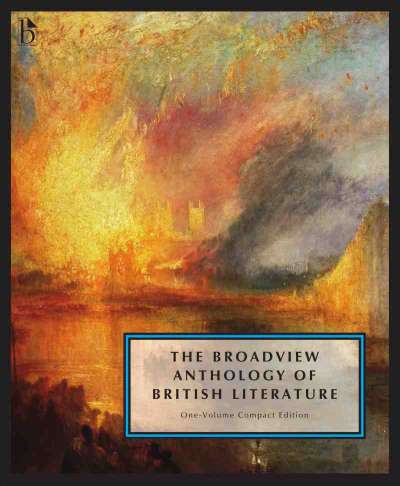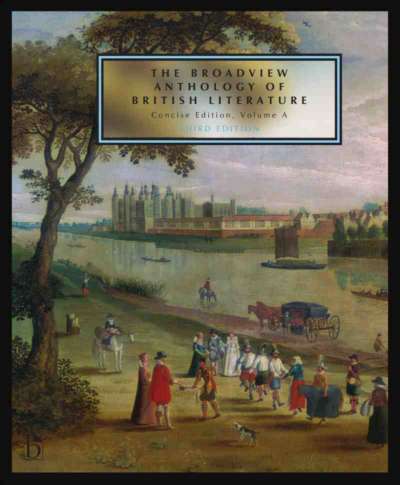In all six of its volumes The Broadview Anthology of British Literature presents British literature in a truly distinctive light. Fully grounded in sound literary and historical scholarship, the anthology takes a fresh approach to many canonical authors, and includes a wide selection of work by lesser-known writers. The anthology also provides wide-ranging coverage of the worldwide connections of British literature, and it pays attention throughout to issues of race, gender, class, and sexual orientation. It includes comprehensive introductions to each period, providing in each case an overview of the historical and cultural as well as the literary background. It features accessible and engaging headnotes for all authors, extensive explanatory annotations throughout, and an unparalleled number of illustrations and contextual materials, offering additional perspectives both on individual texts and on larger social and cultural developments. Innovative, authoritative, and comprehensive, The Broadview Anthology of British Literature embodies a consistently fresh approach to the study of literature and literary history.
The full Broadview Anthology of British Literature comprises six bound volumes, together with an extensive website component; the latter has been edited, annotated, and designed according to the same high standards as the bound book component of the anthology, and is accessible through the broadviewpress.com website by using the passcode obtained with the purchase of one or more of the bound volumes.
Highlights of Volume 6: The Twentieth Century and Beyond include: Joseph Conrad’s “The Secret Sharer,” “An Outpost of Progress,” an essay on the Titanic, and a substantial range of background materials, including documents on the exploitation of central Africa that set “An Outpost of Progress” in vivid context; and a large selection of late twentieth and early twenty-first century writers such as Ian McEwan, Kazuo Ishiguro, and Zadie Smith.
For the convenience of those whose focus does not extend to the full period covered in the Volume 6: The Twentieth Century and Beyond, that volume is now available either in its original one-volume format or in this alternative two-volume format, with Volume 6a (The Early Twentieth Century) extending to the end of WWII, and Volume 6b (The Late Twentieth Century and Beyond) covering from WWII into the present century. Please see the Volume 6 Table of Contents for the exact location of the split.
Comments
Praise for The Twentieth Century and Beyond:
“[The Twentieth Century and Beyond] is better [than the competition] on cultural and social contexts, in its introductions, in its number and quality of images and in the choices of texts beyond the classic ones. … Overall, the Broadview Anthology is an immensely attractive one—adventurous and very wide ranging.” — Enda Duffy, University of California, Santa Barbara
Comments on The Broadview Anthology of British Literature:
“ … sets a new standard by which all other anthologies of British Literature will now have to be measured.” — Graham Hammill, SUNY Buffalo
“With the publication of the Broadview Anthology of British Literature, teachers and students in survey and upper-level undergraduate courses have a compelling alternative to the established anthologies by Norton and Longman. … This is a very real intellectual, as well as pedagogical, achievement.” — Nicholas Watson, Harvard University
“ … an excellent anthology. Good selections for my purposes (including some nice surprises), just the right level of annotation, affordable—and a hit with my students. I will definitely use it again.” — Ira Nadel, University of British Columbia
“After twenty years of teaching British literature from the Norton anthologies, I’m ready to switch to the Broadview. The introductions to each period are key to teaching a survey course, and those in the Broadview seem to me to be both more accessible to students and more detailed in their portraits of each era than are those of the Norton. And Broadview’s selection of authors and texts includes everything I like to teach from the Norton, plus a good deal else that’s of real interest.” — Neil R. Davison, Oregon State University
“Norton’s intros are good; Broadview’s are better, with greater clarity and comprehension, as well as emphasis upon how the language and literature develop, both reacting or responding to and influencing or modifying the cultural, religious/philosophical, political, and socio-economic developments of Britain. The historian and the linguist in me thoroughly enjoyed the flow and word-craftsmanship. If you have not considered the anthology for your courses, I recommend that you do so.” — Robert J. Schmidt, Tarrant County College
For a PDF of the table of contents, click here.
NOTE: The online component of the anthology offers a substantial number of additional readings, edited to the same standards as the bound book. Online readings appear in the hyperlinked sections below; to download these readings, please follow the hyperlinks to the BABL online resources site and log in using your passcode.
PREFACE
ACKNOWLEDGEMENTS
- THE EARLY TWENTIETH CENTURY: FROM 1900 TO MID-CENTURY
- The Edwardian Period
The World Wars
Marx, Einstein, Freud, and Modernism
The Place of Women
Avant-Garde and Mass Culture
Sexual Orientation
Ireland
Ideology and Economics in the 1930s and 1940s
The Literature of the 1930s and 1940s
Literature and Empire
The English Language in the Early Twentieth Century
- HISTORY OF THE LANGUAGE AND OF PRINT CULTURE
- THOMAS HARDY
- Hap
Neutral Tones
The Darkling Thrush
The Ruined Maid
A Broken Appointment
Shut Out That Moon
The Convergence of the Twain
Channel Firing
The Voice
Transformations
In Time of “The Breaking of Nations”
The Photograph
During Wind and Rain
The Oxen
Going and Staying
IN CONTEXT: Hardy’s Reflections on the Writing of Poetry
- A.E. HOUSMAN
- Loveliest of Trees
To an Athlete Dying Young
Terence, This Is Stupid Stuff
The Chestnut Casts His Flambeaux
Epitaph on an Army of Mercenaries
- SIEGFRIED SASSOON
- They
Glory of Women
Everyone Sang
from Memoirs of an Infantry Officer
- ISAAC ROSENBERG
- Break of Day in the Trenches
Dead Man’s Dump
Louse Hunting
Returning, We Hear the Larks
- WILFRED OWEN
- Arms and the Boy
Dulce et Decorum Est
Anthem for Doomed Youth
Strange Meeting
Futility
Letters
- To Susan Owen (7 January 1917)
To Susan Owen (10 January 1917)
To Susan Owen (16 January 1917)
To Colin Owen (2 March 1917)
To Susan Owen ([?16] May 1917)
To Susan Owen (18 May 1917)
To Susan Owen (23 May 1917)
To Susan Owen (22 August 1917)
To Tom Owen (26 August 1917)
To Mary Owen (29 August 1917)
To Susan Owen (4 [or 6] October 1918)
To Susan Owen (8 October 1918)
To Susan Owen (29 October 1918)
To Susan Owen (31 October 1918)
- CONTEXTS: WAR AND REVOLUTION
- from Anonymous, “Introduction” to Songs and Sonnets for England in War Time
“In Flanders Fields”: The Poem and Some Responses
- John McCrae, “In Flanders Fields”
John Mitchell, “Reply to ‘In Flanders Fields’”
J.A. Armstrong, “Another Reply to ‘In Flanders Fields’”
Elizabeth Daryush, “Flanders Fields”
- Anonymous, “I Learned to Wash in Shell-Holes”
J.P. Long and Maurice Scott, “Oh! It’s a Lovely War”
from Rebecca West, “The Cordite Makers”
from Francis Marion Beynon, Aleta Day
- Ivor Gurney, “To His Love”
Vance Palmer, “The Farmer Remembers the Somme”
from Robert Graves, Good-Bye to All That
- from May Wedderburn Cannan, Grey Ghosts and Voices
from “Proceedings” of the All-Russian Central Executive Committee of Soviets of Workers’, Soldiers’, and Peasants’ Deputies
- WILLIAM BUTLER YEATS
- The Lake Isle of Innisfree
When You Are Old
Who Goes with Fergus?
Adam’s Curse
No Second Troy
Easter 1916
The Wild Swans at Coole
In Memory of Major Robert Gregory
Nineteen Hundred and Nineteen
A Prayer for My Daughter
An Irish Airman Foresees His Death
The Second Coming
Meditations in Time of Civil War
Leda and the Swan
Among School Children
Sailing to Byzantium
The Tower
A Dialogue of Self and Soul
Byzantium
For Anne Gregory
Crazy Jane Talks with the Bishop
Lapis Lazuli
The Circus Animals’ Desertion
Under Ben Bulben
IN CONTEXT: Yeats on Poetic Inspiration
- from “The Symbolism of Poetry”
from “Four Years”
from “Introduction” to A Vision
- IN CONTEXT: The Struggle for Irish Independence
- Poblacht na h-Eireann: Proclamation of the Irish Republic
Pádraic Pearse, “Statement”
- DOROTHY RICHARDSON
- About Punctuation
Journey to Paradise
“Foreword” to Pilgrimage
- VIRGINIA WOOLF
- The Mark on the Wall
Blue & Green
Kew Gardens
Mrs. Dalloway in Bond Street
Modern Fiction
A Room of One’s Own
- from “A Sketch of the Past”
IN CONTEXT: Woolf and Bloomsbury
IN CONTEXT: Woolf as Writer
- from Virgina Woolf, A Writer’s Diary
from E.M. Forster, “Review of ‘Kew Gardens’”
from unsigned “Review of ‘Kew Gardens’”
from W.L. Courtney, “Review of Jacob’s Room
- CONTEXTS: GENDER AND SEXUAL ORIENTATION
- from Edward Carpenter, Love’s Coming of Age
- from Havelock Ellis, Sexual Inversion
- from Chapter 3: Sexual Inversion in Men
from Chapter 4: Sexual Inversion in Women
from Chapter 5: The Nature of Sexual Inversion
- from Grant Allen, “Woman’s Place in Nature”
from Cicely Hamilton, Marriage as a Trade
Female Suffrage
- Anonymous, [“There Was a Small Woman Called G”]
from Emmeline Pankhurst, My Own Story
- from Marie Stopes, Married Love
from Virginia Woolf, Orlando
from George Orwell, “Boys’ Weeklies”
from Frank Richard, “Frank Richard Replies to George Orwell”
from Robert Roberts, The Classic Slum
from E.M. Forster, “Terminal Note” to Maurice
from Virginia Woolf, “Old Bloomsbury”
- D.H. LAWRENCE
- Tortoise Shout
Snake
Bavarian Gentians
The Prussian Officer
Odour of Chrysanthemums
The Hopi Snake Dance
Why the Novel Matters
- CONTEXTS: WORK AND WORKING-CLASS LIFE
- from George Orwell, The Road to Wigan Pier
from “A Debate Between G.B. Shaw and G.K. Chesterton, Chaired by Hilaire Belloc”
- from Robert Roberts, The Classic Slum
- KATHERINE MANSFIELD
- Bliss
The Garden Party
Miss Brill
- T.S. ELIOT
- The Love Song of J. Alfred Prufrock
Preludes
Burbank with a Baedeker: Bleistein with a Cigar
Gerontion
The Waste Land
Journey of the Magi
Marina
Burnt Norton
Tradition and the Individual Talent
The Metaphysical Poets
IN CONTEXT: T.S. Eliot and Anti-Semitism
- CONTEXTS: ELIOT, POUND, AND THE VORTEX OF MODERNISM
- from Jules Huret, “Interview with Stephane Mallarmé,” L’Echo de Paris
Imagist and Futurist Poetry: A Sampling
- T.E. Hulme
- Ezra Pound
- In a Station of the Metro
Alba
L’Art, 1910
- H.D.
- Mina Loy
- from “Three Moments in Paris”
- from “Love Songs”
- Imagism and Vorticism
- from F.S. Flint, “Imagisme,” Poetry Magazine
from Ezra Pound, “A Few Don’ts by an Imagiste,” Poetry
from Ezra Pound, “Vorticism,” Gaudier-Brzeska
- from Virginia Woolf, “Character in Fiction”
- Reactions to the Poems of T.S. Eliot
- from Arthur Waugh, “The New Poetry,” Quarterly Review
from Ezra Pound, “Drunken Helots and Mr. Eliot,” The Egoist
from unsigned “Review,” Literary World
from unsigned “Review,” New Statesman
from Conrad Aiken, “Diverse Realists,” Dial
from May Sinclair, “Prufrock and Other Observations: A Criticism,”
Little Review
from “Review of the First Issue of The Criterion,” The Times Literary
Supplement
from Gilbert Seldes, “Review,” The Nation
from I.A. Richards, Principles of Literary Criticism
from Douglas LePan, “Personality of the Poet: Some Recollections of
T.S. Eliot”
-
- DAVID JONES
- from In Parenthesis
- from “Preface”
from Part 7: The Five Unmistakable Marks
from The Sleeping Lord (sites.broadviewpress.com/bablonline)
- ROBERT GRAVES
- The Cool Web
Down, Wanton, Down!
Recalling War
- NANCY CUNARD
- from Jamaica: The Negro Island
from The White Man’s Duty
- STEVIE SMITH
- Mother, Among the Dustbins
The River God
Not Waving but Drowning
The New Age
Away, Melancholy
The Blue from Heaven
Pretty
- GEORGE ORWELL
- from Homage to Catalonia
Politics and the English Language
Shooting an Elephant
IN CONTEXT: Elephants in Asia
- SAMUEL BECKETT
- Whoroscope
from Texts for Nothing
The Calmative
Imagination Dead Imagine
Krapp’s Last Tape
- W.H. AUDEN
- [O what is that sound]
[At last the secret is out]
[Funeral Blues]
Spain 1937
[Lullaby]
[As I walked out one evening]
Musée des Beaux Arts
In Memory of W.B. Yeats
September 1, 1939
from The Sea and the Mirror [Song of the Master and Boatswain]
The Shield of Achilles
“The Truest Poetry Is the Most Feigning”
IN CONTEXT: Auden on the Nature and Craft of Poetry
- CONTEXTS: WORLD WAR II
- Winston Churchill, Speeches to the House of Commons
- from “Blood, Toil, Tears, and Sweat” (13 May 1940)
from “We Shall Fight on the Beaches” (4 June 1940)
from “Their Finest Hour” (18 June 1940)
- from Harold Nicholson, The War Years: 1939–1945
from Charles Ritchie, The Siren Years
Ross Parker and Hughie Charles, “We’ll Meet Again”
Nat Burton and Walter Kent, “The White Cliffs of Dover”
Anonymous, Fucking Tobruk (sites.broadviewpress.com/bablonline)
from John Lehmann, “Foreword” to The Penguin New Writing
David Campbell, “Men in Green”
Keith Douglas, “Vergissmeinnicht”
from Henry Reed, Lessons of War
- Douglas LePan
- “Below Monte Cassino”
“The Haystack”
- Life at Home
Anti-Semitism and World War II
- from Ezra Pound, “Speech to the English”
from George Orwell, “Anti-Semitism in Britain”
from Rebecca West, “Greenhouse with Cyclamens”
from George Bernard Shaw, “The Unavoidable Subject”
- THE LATE TWENTIETH CENTURY AND BEYOND: 1945 TO TWENTY-FIRST CENTURY
- The End of the War and the Coming of the Welfare State
The End of Empire
From the 1960s to Century’s End
Ireland, Scotland, Wales
The New Millennium
The History of the English Language
- DORIS LESSING
- To Room Nineteen
from The Golden Notebook
- from “Introduction” to the 1971 edition
- JUDITH WRIGHT
- Woman to Man
The Bull
Woman to Child
At Cooloola
Sports Field
Two Dreamtimes
from A Human Pattern: Selected Poems
- P.K. PAGE
- The Stenographers
The Landlady
Ecce Homo
Stories of Snow
Young Girls
After Rain
Nursing Home
from “Address at Simon Fraser”
Planet Earth
Calgary
- GRAHAM GREENE
- The Basement Room
IN CONTEXT: Reflections on Writing and Filmmaking
- “Preface” to The Fallen Idol
from “Interview with Marie-Françoise Allain”
- PHILIP LARKIN
- Days
Church Going
Talking in Bed
Dockery and Son
Annus Mirabilis
High Windows
This Be the Verse
Vers de Société
The Old Fools
Aubade
- CONTEXTS: POWER, POLITICS, AND THE BOOK (sites.broadviewpress.com/bablonline)
- The Case of Mrs Warren’s Profession
- from An Act for Regulating Theatres, 1943
Bernard Shaw et al., “The Censorship of Plays”
- “Not Bloody Likely”: The Case of Pygmalion
- from Bernard Shaw, Pygmalion, Act 3
- The Case of Ulysses
- from Hon. John M. Woolsey, United States District Court, Decision in
United States of America v. One Book Called “Ulysses”
from James Joyce, Ulysses, Episode 18: Penelope
- Publishing “Unnatural Politics”: Bernard Shaw’s Common Sense about the War
- from Bernard Shaw, Common Sense about the War
- The Case of J.B. Priestley’s Wartime Broadcasts: “He Gave Us… An Ideology”
- from “Less Bread and More Taxes”
from “A Few Words to the Pot-and-Kettle Theorists”
from “First Anniversary of the War”
from “Going North”
- The Case of Lady Chatterley’s Lover
- from The Obscene Publications Act
from D.H. Lawrence, Lady Chatterley’s Lover: Chapter 3
from Mervyn Griffith-Jones, Address to the Jury, Regina v. Penguin Books Limited
from Gerald Gardiner, Address to the Jury, Regina V. Penguin Books Limited
from Dame Rebecca West, Testimony on Behalf of the Defense, Regina v. Penguin Books Limited
from Sir Allen Lane, Testimony on Behalf of the Defense, Regina v. Penguin Books Limited
- The Case of The Satanic Verses
- ALAN SILLITOE
- The Loneliness of the Long-Distance Runner
IN CONTEXT: “Angry Young Men”
- from John Osborne, A Better Class of Person: An Autobiography
- Passing Looks at Christmas
- THOM GUNN
- The Wound
Tamer and Hawk
To His Cynical Mistress
The Hug
The Missing
- TED HUGHES
- The Thought-Fox
Pike
Wodwo
Theology
A Childish Prank
The Seven Sorrows
Heptonstall Old Church
You Hated Spain
Daffodils
- CONTEXTS: PUBLIC VOICES: THE END OF EMPIRE AND A NEW BRITAIN
- The “Quit India” Movement
- from Mohandas K. Gandhi, “Speech to the All India Congress Committee”
from Sir Stafford Cripps, “Statement on India”
- from Martin Luther King, “The Birth of a New Nation”(sites.broadviewpress.com/bablonline)
from Harold Macmillan, “Speech Made to the South African Parliament”
from Manmohan Singh, “Acceptance Speech on the Occasion of the Awarding of the Degree of Doctor of Civil Law, Honoris Causa”
from Winston Churchill, “Campaign Speech”
from Clement Attlee, “Speech on the King’s Address”
from Enoch Powell, “Speech on Race and Immigration”(sites.broadviewpress.com/bablonline)
from Margaret Thatcher, “Speech to the Conservative Party Conference”
from Tony Blair, “Speech to the Labour Party Conference”
from Tony Blair, “Speech on the War in Iraq and Global Terrorism”(sites.broadviewpress.com/bablonline)
- CHINUA ACHEBE
- The Sacrificial Egg
from “An Image of Africa: Racism in Conrad’s Heart of Darkness”
- DEREK WALCOTT
- A Far Cry from Africa
Ruins of a Great House
A Letter from Brooklyn
from Midsummer
- SEAMUS HEANEY
- Digging
Thatcher
The Wife’s Tale
The Grauballe Man
Punishment
Casualty
Seeing Things
Englands of the Mind
- NGŨGĨ WA THIONG’O
- from Decolonising the Mind
- Chapter 3
Chapter 4
Chapter 5
- LES MURRAY
- An Absolutely Ordinary Rainbow
Bent Water in the Tasmanian Highlands
The Quality of Sprawl
Pigs
The Mare Out on the Road
- MARGARET ATWOOD
- Further Arrivals
Death of a Young Son by Drowning
The Immigrants
Later in Belleville: Career
Daguerreotype Taken in Old Age
Thoughts from Underground
A Bus along St. Clair: December
[you fit into me]
The Handmaid’s Tale and Oryx and Crake in Context
IN CONTEXT: Susanna Moodie (sites.broadviewpress.com/bablonline)
- from Susanna Moodie, Roughing It in the Bush
from Susanna Moodie, Life in the Clearings versus the Bush
- MICHAEL ONDAATJE
- Letters & Other Worlds
Travels in Ceylon (from Running in the Family)
- JOHN CLEESE AND GRAHAM CHAPMAN
- from Monty Python’s Flying Circus
- Dead Parrot Sketch
Pet Conversion
Dirty Hungarian Phrasebook
Spam
- PAUL MULDOON
- Good Friday, 1971. Driving Westward
Our Lady of Ardboe
The Sightseers
Cherish the Ladies
Milkweed and Monarch
The Plot
Anonymous: Myself and Pangur
- DAVID DABYDEEN
- Slave Song
Coolie Odyssey
from Turner: New and Selected Poems
- CAROL ANN DUFFY
- Stealing
Adultery
The Good Teachers
Drunk
Mean Time
Mrs. Lazarus
Wish
Rapture
- DIRECTIONS IN LATE TWENTIETH- AND EARLY TWENTY-FIRST-CENTURY POETRY
- Geoffrey Hill
- from Mercian Hymns
A Short History of British India (2)
from The Triumph of Love
- Tony Harrison
- Them & [uz]
t’Ark
from V
from Sonnets for August 1945
- Tom Raworth
- Out of A Sudden
Looking for Language
- David Harsent
- Craig Raine
- A Martian Sends a Postcard Home
- Eavan Boland
- Night Feed
Anna Liffey
Listen. This is the Noise of Myth
Against Love Poetry
- Veronica Forrest-Thomson
- James Fenton
- Grace Nichols
- Skanking Englishman Between Trains
Epilogue
Love
White
- Medbh McGuckian
- Slips
The Sofa
The Dream-Language of Fergus
- Maggie O’Sullivan
- Linton Kwesi Johnson
- Moniza Alvi
- And If
How the World Split in Two
- Jean Binta Breeze
- Gwyneth Lewis
- Jackie Kay
- Simon Armitage
- The English
It Could Be You
- Alice Oswald
- Caitriona O’Reilly
- Hide
A Brief History of Light
APPENDICES
Reading Poetry
Maps
Monarchs and Prime Ministers of Great Britain
Glossary of Terms
Texts and Contexts: Chronological Chart (sites.broadviewpress.com/bablonline)
Bibliography (sites.broadviewpress.com/bablonline)
Permissions Acknowledgements
Index of First Lines
Index of Authors and Titles
Our Editorial Team:
Joseph Black, University of Massachusetts
Leonard Conolly, Trent University
Kate Flint, University of Southern California
Isobel Grundy, University of Alberta
Wendy Lee, New York University
Don LePan, Broadview Press
Roy Liuzza, University of Tennessee
Jerome J. McGann, University of Virginia
Anne Lake Prescott, Barnard College
Barry V. Qualls, Rutgers University
Jason Rudy, University of Maryland
Claire Waters, University of California, Davis
The Broadview Anthology of British Literature companion sites include content for both instructors and students.
The Online Resources Site for both students and instructors features close to 200 interactive review questions; over 500 online readings across all volumes of the anthology, with 30 additional readings specific to this volume; details on British currency; chronological charts; bibliographies; an audio library with 37 samples ranging from Old English to the early 20th Century; and more. An access code to the website is included with all new copies. If you purchased a used copy or are missing your passcode for this site, please click here to purchase a code online.
A separate instructor site features background material, over 200 discussion questions, and “Approaches to Teaching” for key works and authors in the anthology; it also offers a list of anthology contents by theme and region. An access code to the website is included with all examination copies.
PACKAGES:
Add any standalone edition to a package containing one or more of our anthology volumes for free! A second edition may be added for only $10. To view a complete list of available editions, take a look through our full editions chronology.
Multiple volumes of The Broadview Anthology of British Literature can also be packaged together:
- Package of any TWO of Volumes 1-6: $90.95
- Package of any THREE of Volumes 1-6: $101.95
- Package of Concise Volumes A and B: $110.95
To obtain a package ISBN, or to inquire about other discounted package options, please contact your Broadview representative or customerservice@broadviewpress.com. Further discounts may be available for large courses.
CUSTOM TEXTS:
Broadview is happy to create a custom text including only your selected readings, from this and/or any of our other anthologies and editions (with the exception of copyright-protected readings that are controlled by rights holders other than Broadview Press). We offer an easy and intuitive Custom Text Builder, and you can also contact our Custom Text Administrator.
Features of The Broadview Anthology of British Literature
- • Unrivalled flexibility
- • Superb, comprehensive introductions
- • Extraordinarily wide range of authors included
- • Close attention paid to issues of race, gender, class, and sexual orientation
- • Substantial coverage of the worldwide connections of British literature
- • More extensive—and more helpful—annotations than in competing anthologies
- • Extensively illustrated throughout
- • Fuller range of contextual materials than any competing anthology
- • Substantial online resources
- • An instructor’s guide that features background material, discussion questions, and “Approaches to Teaching” for key works and authors in the anthology
- • A companion website for students that includes a wide range of additional selections (as well as an audio library, review questions, chronological charts, and more)
- • Can be packaged with any of Broadview’s standalone editions; one edition can be included for free with the anthology, a second can be added for $10
- • Can be customized for courses requiring fewer or differently-arranged readings
Features of The Twentieth Century and Beyond
- • Complete texts of Mrs. Warren’s Profession, A Room of One’s Own, Krapp’s Last Tape, Pinter’s The Homecoming, and Stoppard’s Professional Foul
- • Joseph Conrad’s “The Secret Sharer,” “An Outpost of Progress,” an essay on the Titanic, and a substantial range of background materials, including documents on the exploitation of central Africa that set “An Outpost of Progress” in vivid context
- • Large selection of late twentieth-century and contemporary luminaries, including a distinct section on “Directions in Late Twentieth- and Early Twenty-First-Century Poetry”
- • Diverse representation of the modern and contemporary eras, from Virginia Woolf and Nancy Cunard to Graham Greene and Angela Carter; from James Joyce and T.S. Eliot to Monty Python’s Flying Circus
- • “Contexts” sections on “War and Revolution,” “Gender and Sexual Orientation,” “Work and Working-Class Life,” “Eliot, Pound, and the Vortex of Modernism,” “World War II,” and “Public Voices: The End of Empire and a New Britain”
- • Companion website includes “Contexts” section on “Power, Politics, and the Book” in addition to numerous distinct sections for writers such as Alice Meynell, Saki, Hugh MacDiarmid, and so on
- • Volume 6 is available either in its original one-volume format or in separate volumes covering The Early Twentieth Century (Volume 6a, extending to the end of WWII) and The Late Twentieth Century and Beyond (Volume 6b, from WWII to the present century)


